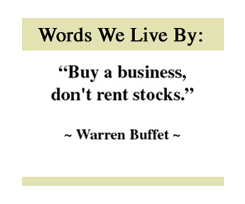"If you want to succeed, it's common sense to study success."
So remarked Warren Buffett, Berkshire Hathaway's BRK.B chairman and CEO, and we'd have to agree. Buffett's remarkable investment success has made his annual shareholder letter, part of Berkshire's 2004 annual report, a must-read for any investor who hopes that a little of Buffett's magic may rub off. We've already reviewed some of the lessons for fund investors in this year's letter, but we also think stock investors have much to gain. Commentary on Buffett's annual letters is now somewhat ubiquitous, so we'd like to take a different tack and share three less-obvious insights we gleaned...
 |
Buffett's explicit advice for investors was to try and avoid excitement (excessive trading) and expenses (additional, voluntary fees and taxes from that trading), noting that an index fund investment made 35 years ago would have produced excellent results. Fair enough. But a little later, Buffett actually demonstrates a much better strategy--when an attractive margin of safety is available, buy shares in companies that will consistently augment their value over time. Berkshire's famous stock investment table demonstrates the fruits of this approach. Buffett's $11 million investment in The Washington Post Company WPO in 1974 has blossomed into $1.7 billion. Berkshire's (approximate) 15,300% return certainly looks more attractive than the S&P 500's comparatively paltry 1,700% gain. Yet how many of us could realistically plan to invest in a stock, then simply hold it for more than 30 years? But therein lies the magic. So next time you're contemplating buying or selling, stop and compare the benefits of doing nothing. Will you end up lamenting a 15,000% gain that you impatiently traded away? .
 |
Berkshire's Washington Post investment notwithstanding, a "buy-and-hold" mindset should never substitute for critical, independent thinking. Buffett lamented that during "The Great Bubble" he merely clucked "about nosebleed valuations" and that he "underestimated just how severe the overvaluation was." And more directly, "I talked when I should have walked." We think this is a great insight for stock investors, and one that may be overlooked all too easily. .
Ideally, we'd recommend holding stocks for the long term--as with Berkshire's Washington Post investment--but always subject to a critical caveat: Wherever possible, don't hold an extremely overvalued stock. Coke KO offers a useful example. In 1999, the share price exceeded $70 on several occasions, while today it trades for about $43--and our fair value estimate is $54. So over the past five years, Berkshire's return on its Coke stake amounts to about -40%. Even if Coke traded in line with our fair value estimate, Berkshire's return would still be an uninspiring -23%. The 5% return Berkshire could have earned by selling Coke in 1999 and investing the proceeds in cash instead sure looks a lot healthier. So which stocks are so overvalued that a buy-and-hold approach no longer makes sense? At Morningstar, we generally consider any stock trading above our "Consider Selling" price--which results in a 1-star rating--unsuitable for any type of investment, even a buy-and-hold approach. .
 |
Finally, have some fun--serendipity might just strike. A large contingent of armchair experts pontificate on Berkshire's potential stock investments, and while we don't consider this relevant to any serious Berkshire investment appraisal, it is an enjoyable hobby for several Morningstar analysts. So here's our speculation--Berkshire might be buying a sizable stake in Wal-Mart Stores WMT.
How did we read the entrails? Clue #1: In a Jan. 28 talk with students at Vanderbilt University, Buffett noted that he was currently investing several billion into a stock. Wal-Mart is certainly large enough for this. Clue #2: In his 2003 letter, Buffett praised Wal-Mart's honesty when describing Berkshire's McLane acquisition. Clue #3: At the 2004 Berkshire annual meeting (refer to the subheading titled "Investment Mistakes") Buffett admitted he had previously erred in not buying Wal-Mart, having abandoned a prior effort because the price moved up a little. Passing up a growing wide-moat company ranked high on Buffett's self-confessed list of errors. Clue #4: In referring to Berkshire subsidiary Garan in the 2004 annual letter, Buffett recommends purchasing the product at Wal-Mart--even though Garanimals are widely available elsewhere. Berkshire's annual meeting consistently demonstrates that Buffett is a master merchandiser--perhaps he now has a vested interest in boosting Wal-Mart sales beyond the obvious benefit to McLane.
But ultimately, it doesn't matter if we're right or wrong on Wal-Mart. Thinking through that simple exercise helped us evaluate Wal-Mart the way Buffett would. Wide moat? Check. Good stewardship? Check. Attractive growth prospects? Check. Available at a discount to fair value? Check (well, almost). Did we have some fun along the way? Hopefully. Did we gain a useful perspective on a potential investment? We'd have to say yes--and that's the point. Learning to think about stocks the same way as one of history's most talented investors may well prove to be one of the best investment strategies there is. And Berkshire's annual letter is an excellent place to nurture that mindset.